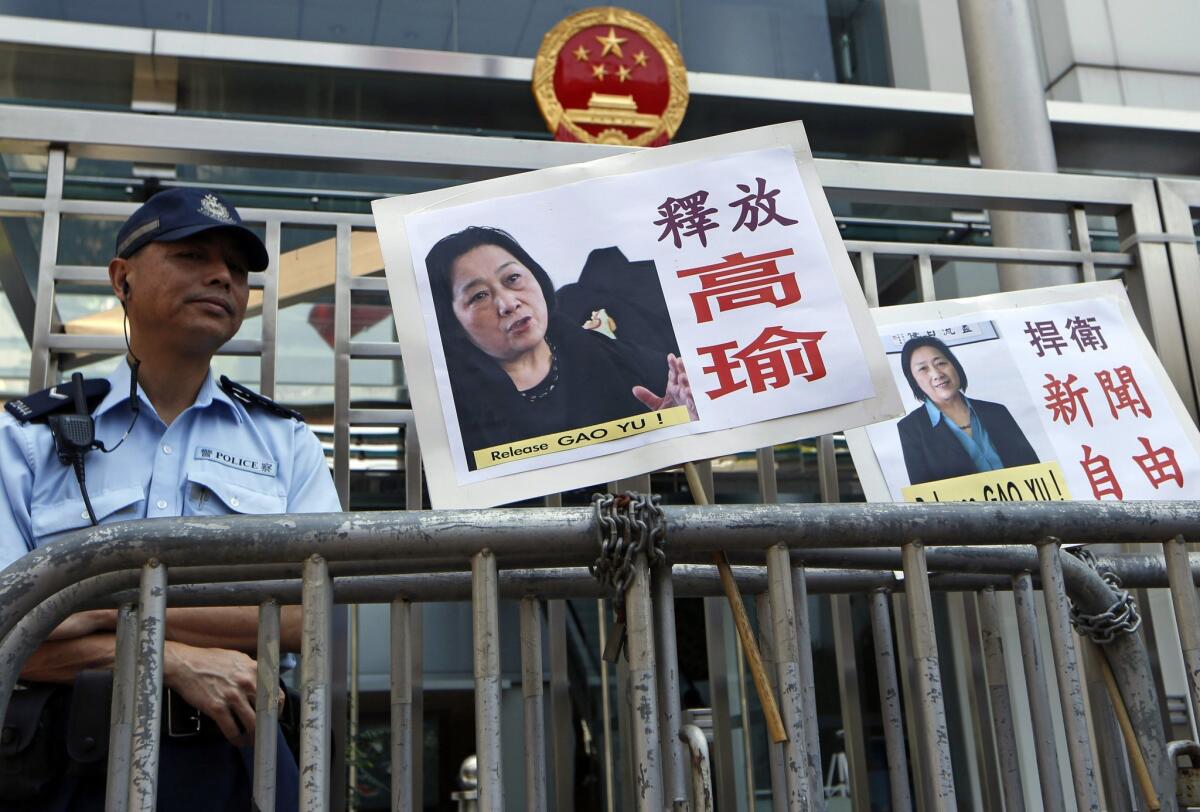Chinese journalist, 71, accused of leaking secrets gets 7 years in prison

- Share via
Reporting from Beijing — A Chinese court on Friday sentenced a 71-year-old journalist to seven years in prison on charges of leaking state secrets in a case denounced by human rights groups as politically motivated and arbitrary.
Gao Yu was accused of sending an internal Communist Party communique known as Document No. 9 to the U.S.-based Chinese language website Mingjing News, which published the text in 2013.
The document, which apparently originated after Xi Jinping assumed leadership of the party in late 2012, urged tighter ideological control over Chinese society and warned against promoting judicial independence, media freedom and civil society.
Mingjing editor Ho Pin has denied receiving the document from Gao, who was detained in April 2014. A videotaped confession made by Gao was aired last May on state-run television ahead of her closed-door November trial; Gao and her representatives later said the recording was made under duress when authorities were threatening to arrest her son.
“We cannot agree with this verdict. They didn’t have any evidence; they just saw the document on the Mingjing website and decided it was from her,” said Mo Shaoping, an attorney for Gao, in a phone interview. “She wants to appeal and we will meet with her next week to discuss the strategy, even though in Chinese legal proceedings the number of successful appeals is very low.”
Mo said the No. 3 Beijing Intermediate People’s court refused to acknowledge both Ho’s written testimony that Gao had not provided him with the documents and her initial statement to police upon her arrest, in which she insisted she was innocent during 10 hours of questioning. “All of this evidence has been neglected by the court except for the so-called confession,” he said.
Mark P. Lagon, president of the U.S.-based human rights group Freedom House, said the seven-year term could “effectively be life imprisonment. Her televised confession and ludicrous sentencing are reminders that despite Xi Jinping’s rhetoric about promoting the ‘rule of law,’ China’s judges report to one authority -- the Chinese Communist Party.”
Document No. 9 said in part: “Western anti-China forces and internal ‘dissidents’ are still actively trying to infiltrate China’s ideological sphere and challenge our mainstream ideology.”
“Some of their latest major efforts include: Some people have disseminated open letters and declarations and have organized petition-signings to vocalize requests for political reforms, improvement of human rights, release of ‘political prisoners,’ reversing the verdict on the [1989] Tiananmen incident, and other such political demands.”
“They have made a fuss over asset disclosure by officials, fighting corruption with the Internet, media supervision of government, and other sensitive hot-button issues, all of which stoke dissatisfaction with the Party and government,” the document continued. “Western embassies, consulates, media operations, and NGOs operating inside China under various covers are spreading Western ideas and values and are cultivating so-called ‘anti-government forces.’”
William Nee, China researcher at Amnesty International, called Gao “the victim of vaguely worded and arbitrary state-secret laws that are used against activists as part of the authorities’ attack on freedom of expression.”
“Gao Yu is a prisoner of conscience, solely imprisoned for challenging the views of the government,” he added. “She should be released immediately and unconditionally.”
Gao has written about Chinese economics, politics and social issues for media outlets in Hong Kong and elsewhere overseas. She previously served time in prison on state secrets charges in the 1990s.
Tommy Yang in the Times’ Beijing bureau contributed to this report.
Follow @JulieMakLAT for news from China
More to Read
Sign up for Essential California
The most important California stories and recommendations in your inbox every morning.
You may occasionally receive promotional content from the Los Angeles Times.














